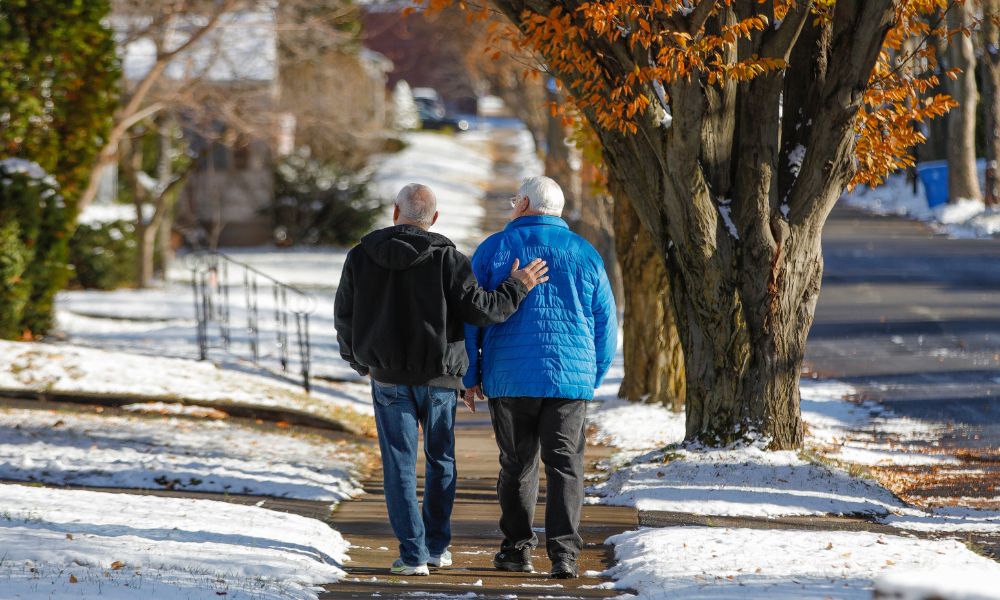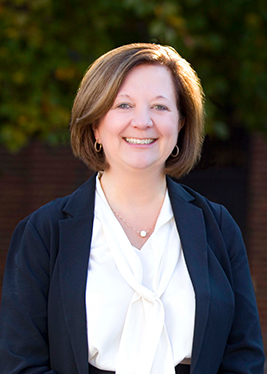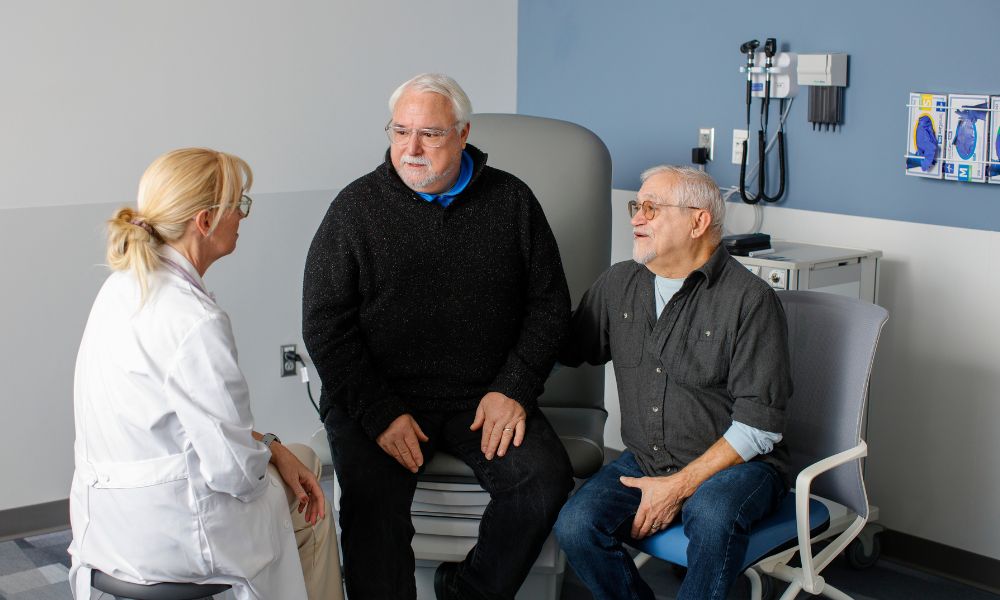UR Nursing Research Champions Family Caregivers
By Gianluca D'Elia
Wednesday, January 1, 2025

This feature appears in the Winter 2024-25 issue of Rochester Nursing. Read the full magazine.
Jennifer Brayer’s visits with her mother are often filled with coffee shop dates, short walks outdoors, and trips to the craft store to buy yarn for new knitting projects.
These activities have strengthened their bond and served as bright spots amid the challenges of being a family caregiver. Last spring, Brayer moved to the Rochester area to be closer to her parents after managing their care and finances from afar in New England. The seven-hour distance became increasingly difficult to handle as her mother began to show signs of Alzheimer’s disease.
“It’s extremely rewarding that I can spend that time with her, and just visit. It doesn’t have to be about a doctor’s visit or a financial appointment,” Brayer said.
 Fellow Rochester resident Ivette Alvarez has been caring for her mother, who has dementia, for the past four years. Every week, she looks forward to volunteering at Centro de Oro (in Spanish, the Golden Center), an Evergreen Street senior center for older Latino adults where she brings her mother and volunteers. The center provides therapeutic activity and mental stimulation for her mom, but it’s also a significant part of Alvarez’s social life.
Fellow Rochester resident Ivette Alvarez has been caring for her mother, who has dementia, for the past four years. Every week, she looks forward to volunteering at Centro de Oro (in Spanish, the Golden Center), an Evergreen Street senior center for older Latino adults where she brings her mother and volunteers. The center provides therapeutic activity and mental stimulation for her mom, but it’s also a significant part of Alvarez’s social life.
“It’s my happy place,” said Alvarez, who received a Volunteer of the Year Award from the Rochester nonprofit Latinas Unidas in December for her work at Centro de Oro. “She can go there and show symptoms of dementia, and they won’t judge her or treat her differently, and I get lots of love too.”
Deepened relationships and quality time with family are among the greatest rewards of caregiving, but the role also comes with challenges such as increased stress, social isolation, and the nuances of managing a loved one’s condition. Brayer has experienced feelings of guilt about whether she’s “doing enough.” Alvarez sometimes wishes she had more expertise on how to handle her mother’s hallucinations and other psychological symptoms.
These experiences are common for individuals who take on a caregiver role, said School of Nursing Dean Lisa Kitko, PhD, RN, FAHA, FAAN, a professor of nursing and geriatric medicine who has studied the palliative care needs of persons living with complex chronic conditions and their family caregivers. A growing body of research across the U.S. shows that caregivers may not be receiving the care they need to live longer, healthier lives themselves.

According to the U.S. Centers for Disease Control and Prevention, 1 in 5 adults provide some form of regular care or assistance to a family member or friend with a health problem or disability, and a third provide care for at least 20 hours per week. The number of family caregivers in the U.S. continues to increase as the nation’s population of older adults and people with disabilities continues to grow.
“The typical caregiver likely has an ever-growing and changing to-do list, and most of them probably do not add ‘take care of myself’ to that list. While caregiving can be a very rewarding experience, it can also take a huge physical and mental toll on even the strongest person,” Kitko said.
Researchers at UR Nursing and across the University are actively addressing the complex challenges that caregivers face.
Kathi Heffner, PhD, is a professor of nursing, medicine, and psychiatry who studies links between stress and health in older adulthood. There has been a great need for interventions that affect caregivers’ well-being, she said.
Heffner’s recent research has focused on protecting dementia caregivers’ emotional health, improving their sense of resilience, and helping them manage their emotions and adapt to stressors. Heffner and colleagues across the University have tried various methods, such as a mindfulness-based stress reduction program, cognitive computerized training or “brain games,” and social connectedness and engagement.
“We’re trying to strengthen the resilience of caregivers, so that when they face those stressors — which are going to be inevitable — they’re going to be better able to handle them.”
Preliminary data from the Mindfulness program showed that participants had an improved ability to regulate their mood around caregiving. Typically, depression symptoms among family caregivers are linked to increased severity in their loved one’s dementia, but Mindfulness participants didn’t show those changes in mood.
Shortly after she moved to Rochester, Brayer had an opportunity to take part in an Engaged Coaching Project for caregivers, led by aging researchers at URMC’s HOPE Lab (Helping Older People Engage). Previously, she had never been exposed to healthcare professionals who were leading caregiver-focused research. The program paired her with a coach for a series of sessions dedicated to improving her well-being and reducing stress.
“Caregivers need support and social connections to enable them to be effective,” Brayer said. “It was interesting to have someone say, ‘How are you doing?’ That’s rare. Usually, the focus is on the patient and their condition, whether it’s someone with dementia, or a stroke survivor.”
While caregivers often report that the role is meaningful to them, it can also affect individuals’ identities and perceptions of themselves, Heffner said. Similar to the experience Brayer had, many study participants who Heffner meets are amazed to learn that there is research dedicated to caregivers and their well-being.
“Having more researchers focused on ways to support caregivers and protect their well-being is important, especially because caregivers themselves are not always focused on that,” Heffner said.

Nurses and nursing researchers, who are trained to consider the whole person outside of their physical needs alone, are in a unique position to address caregivers’ various needs.
“We know that family caregivers often go unnoticed or underappreciated, but that they are also critical to the survival and well-being of the patient,” said Meghan Underhill, PhD, APRN, AOCNS, FAAN, an assistant professor and family nurse practitioner (FNP) whose research focuses on improving care for individuals and families living with inherited cancer risks.
As an FNP working in Wilmot Cancer Institute’s Hereditary Cancer Screening & Risk Reduction Program, she often meets cancer caregivers who experience added worry and anxiety about their own risks while supporting a loved one.
“Even though risk for cancer doesn't equate to a cancer diagnosis, it can certainly feel like that to the person who's actively providing care to a person with that disease. You might be told that you have a 10 percent risk, but it feels like 100 because here you are living with it, facing it through your loved one.”
“Nurse practitioners in genetics look at the whole family’s experience, and we provide counseling and support around that,” she explained.
Amid the worry that cancer caregivers experience, there are also opportunities for empowerment: for many family members, supporting a loved one through treatment is a chance to change their own narrative and take steps toward a healthier future, Underhill said.
“People can say, ‘now I know, and I’m going to get ahead of this. My parent didn’t have the power of knowing they were at risk for pancreatic cancer, but I’m going to get screened, stop smoking, and do all that I can to change that story.’”
While Rochester has made advances in caregiver support, there remains a national need for government funding and resources to translate research findings into programming, said Associate Professor Jinjiao Wang, PhD, RN, a nurse scientist whose work is focused on improving older adults’ quality of life, safety, and outcomes in home healthcare. She hopes to see more caregiver programs not only created, but reimbursed.
Her research in geriatric home healthcare and personal experiences as a family caregiver have deepened her understanding of the role.
“Caregivers are innovators in their own spaces. They’re charged with a lot of responsibilities, very often with little support, and they find solutions to make things work,” Wang said.
There is also a great need for culturally relevant services for caregivers. Ethnic minority caregivers are more likely to provide care for a family member than their white counterparts, but report worse physical health outcomes, the American Psychiatric Association reports.
Assistant Professor of Clinical Nursing Maria Quiñones-Cordero, PhD, is currently working on a cultural adaptation of Tele-Savvy, an online psychoeducational and skill-building program for dementia caregivers, to better meet the unique needs of Latino adults. Evidence shows that the program has helped reduce depression and stress while improving caregivers’ self-efficacy.
Existing caregiving interventions have mostly been developed with highly educated, white populations, and their findings often do not translate to diverse communities, Quiñones-Cordero said. She and her community partners are considering factors such as language, learning and communication styles, attitudes and stigma surrounding dementia, and the importance of collectivism in Hispanic and Latino cultures as they develop an adaptation of Tele-Savvy.
“We want Latino caregivers to be able to see themselves reflected in the content they are learning, so that it can be more meaningful and helpful to them in the process of caring for a loved one,” she said. “It’s important for Latinos to learn about dementia in the context of our culture and community.”
Ivette Alvarez knows firsthand that cultural competency can make a difference. Many of her Hispanic family and friends, for example, are reluctant to consider placing their older relatives in long-term care facilities. “As Hispanics, we’re like, ‘I’ll never put my mom in a home…’ It has to be the total end of the line, where you can’t take care of them anymore,” she said.
While shouldering the responsibility of caring for aging family members is a cultural norm for many Hispanic and Latino families, Alvarez said it’s important to know when to take a step back.
“Don’t be a caretaker every day – you can’t sustain that. It’s too much emotion for one person,” Alvarez said. “Even the best person is going to have a day where they can’t do it.”
Both Alvarez and Jen Brayer also stressed that individuals’ transition to the caregiver role needs more attention early on, and that it’s important to educate yourself on a loved one’s condition as soon as you can.
“When a parent starts showing signs of dementia, you go through that phase of wondering if it’s just old age or something else. That’s when you start to feel overwhelmed and wonder if you’re doing the right thing,” Brayer said.
“I never knew much about dementia when it first started for my mom,” Alvarez added. “I would have loved to be more prepared. If someone has a parent that’s at the beginning stages, I want to let them know it’s going to get difficult, and to maybe make some videos.”
Considering advice she’d give to fellow caregivers, Brayer said it’s important to be patient and give yourself grace.
“People don’t always realize how isolating or stressful it’s going to be. If someone is new to caregiving and thinking, ‘I must not be doing this right,’ it’s just hard. There’s no way around that. Even if you’re the best family member ever, it’s important to set realistic expectations.”
“Keep reminding yourself that you’re doing the best you can,” she said.
Here are some helpful tips from UR Nursing experts for those who are caring for a loved one with a chronic condition or disability:
- Be aware of the signs of caregiver stress. Recognize signs early and be proactive about seeking help. Physical signs might include blurred vision, high blood pressure, stomach irritation, or frequent headaches. This stress can also manifest mentally or behaviorally through signs such as fatigue, feeling sad or irritable, difficulty concentrating, or changes in appetite.
- Talk to your healthcare provider about your needs. It’s important to have the courage to advocate for yourself, have a conversation with your provider about your role in a loved one’s care, and ask questions about things you don’t understand.
- Keep an eye on your own health. Stay current with your medical and dental appointments, and let your healthcare professional know if you are experiencing signs of depression, which can be managed with talk therapy or medication.By making your own physical, mental, and emotional health a priority, you are going to be better able to help your loved one.
“You do need to consider that if you get sick, who is going to take you to the doctor, care for your loved one, handle the household chores and your job duties if you’re still working?” Dean Lisa Kitko said. “That is why taking care of yourself really should be the first item on your caregiver checklist.”
- It’s OK to ask for help. Needing time off from caregiving duties is essential. Look into respite care services, or ask family and friends to step in when you need to rest. “Sometimes, we think we have to be this super-daughter or super-wife, and we have to take care of everything ourselves, but asking for help is one of the most crucial things we need to do,” said researcher and psychologist Maria Quiñones-Cordero.
-
Make the most of local resources: For those who live in the Western New York region, UR Nursing researchers recommend connecting with Lifespan, a nonprofit that provides classes, guidance, health & wellness programming, and more than 30 other services for older adults and caregivers.
- Be intentional about making time for yourself. “That can even be going to another room and doing breathing exercises, or arranging for respite care — not just to buy groceries or pick up medications, but to do something for yourself,” researcher Kathi Heffner said.
- Build a support system and share your feelings. For those caring for a loved one who has survived a heart attack or stroke, the American Heart Association operates an online Support Network with a section just for caregivers at supportnetwork.heart.org.
- Set boundaries. Caregiver guilt is a common feeling, especially when you think you could be doing more. “Say no when it’s appropriate, don’t dwell on what you can’t change, and recognize you are trying your best,” Dean Lisa Kitko said.
Visit our Research mission to learn more about active projects. Get the latest UR Nursing news in your inbox.

